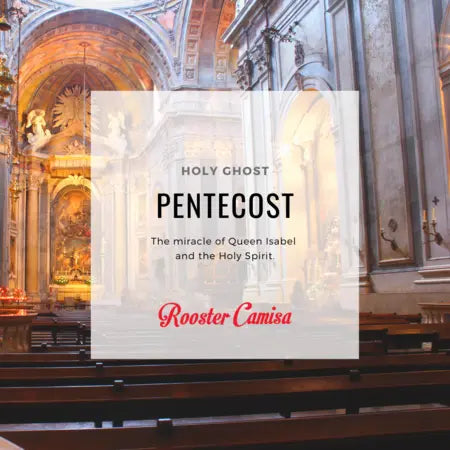
Pentecost is known as a pivotal event in the development of Christianity. It is believed to be the day that the Holy Spirit stepped into the scene and indwelled in all who were present the flame of love and passion for following the Church's ways. It is referred to as the birthday of the Church. Like Christians throughout the world, the Portuguese celebrate Pentecost with great passion. But the celebration combines itself with another important event in the Portuguese calendar—the miracle of Queen Isabel and the Holy Spirit.
Each year in Portuguese communities, especially those with Açorean background, the season for the festas do Espirito Santo (festivals of the Holy Spirit) begins on or near Pentecost Sunday. The reason the season is specific to Pentecost Sunday is because of the timing of the miracle involving the much-beloved Queen (Saint) Isabel. Isabel, a Spanish princess, was given in marriage to King Diniz of Portugal early in the 12th Century. She was a devout Catholic and described as an equally pious wife. Although the King was known to be a good ruler, he was not prone to the same love of prayer and practicing virtues for which Queen Isabel was known. She was beloved by her subjects and demonstrated great kindness to those who suffered the effects of a devastating drought followed by a long famine.
During her reign, thousands of her people died due to disease, lack of water, and scarcity of food. At one point, Queen Isabel made a habit of taking food to those who greatly hungered, and for whom there was never enough to stave off starvation. Legend has it that one day, King Diniz learned of his wife's habit of sneaking food out of the palace and confronted her. Because her habit was to hide food in her apron, when confronted, she unfolded her apron to reveal, not the stolen bread, but roses. It is believed that her generosity had been honored by the Holy Spirit.
Because of that miracle, Queen Isabel arranged Catholic masses to be said continuously during a nine-day period until the day of Pentecost. On that day, people witnessed three ships sail up the harbor and docked in Lisbon. Those ships contained enormous amounts of grain, which effectively ended the dismal hunger for so many people. It is said that it also began to rain after several years of drought. This, too, was considered an immense miracle. Queen Isabel's devotion to her people was symbolized by the promise she made to the Holy Spirit to lay down her jeweled crown on the church's altar. The cherished Queen Isabel and Pentecost are forever woven in the tapestry of the Portuguese culture.

Photo Credit to Church of the King
It is the steadfast commitment to celebrating Pentecost and Queen Isabel that comes one of the most beloved of all connections between the Portuguese and Pentecost-the following of the Espirito Santo (Holy Spirit). What some refer to as "the cult of the Holy Spirit" (no negative connotation meant with the term), this movement has remained an anchor within the Portuguese culture for generations, primarily for those of Açorean descent. Because the profound tradition of celebrating the Holy Spirit’s miracle, as it relates to Queen Isabel’s, is a subject deserving of a dedicated blog, I'll leave the topic for now.
Whether focusing on Queen Isabel or the Holy Ghost, Pentecost is a sacred, joyous time for the Portuguese because of the formative role religion had in the Portuguese culture. After all, in a culture that embraces every celebration, it's only fitting that one of the most important birthdays of the year, that of the church, remains a special time for the Portuguese.

Written by Margaret Resendes Peek

